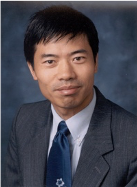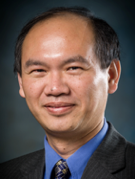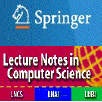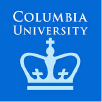
Prof. David A. Bader
New Jersey Institute of Technology, USA
Fellow of the IEEE, AAAS, & SIAM
Title: Massive-scale Analytics
Abstract: Data science aims to solve grand global challenges such as: detecting and preventing disease in human populations; revealing community structure in large social networks; and improving the resilience of the electric power grid. Unlike traditional applications in computational science and engineering, solving these social problems at scale often raises new challenges because of the sparsity and lack of locality in the data, the need for research on scalable algorithms and architectures, and development of frameworks for solving these real-world problems on high performance computers, and for improved models that capture the noise and bias inherent in the torrential data streams. In this talk, Bader will discuss the opportunities and challenges in massive data science for applications in social sciences, physical sciences, and engineering.
Bio: David A. Bader is a Distinguished Professor in the Department of Computer Science at New Jersey Institute of Technology. Prior to this, he served as founding Professor and Chair of the School of Computational Science and Engineering, College of Computing, at Georgia Institute of Technology. He is a Fellow of the IEEE, AAAS, and SIAM, and advises the White House, most recently on the National Strategic Computing Initiative (NSCI). Bader serves on the leadership team of Northeast Big Data Innovation Hub as the inaugural chair of the Seed Fund Steering Committee. Dr. Bader is a leading expert in solving global grand challenges in science, engineering, computing, and data science. His interests are at the intersection of high-performance computing and real-world applications, including cybersecurity, massive-scale analytics, and computational genomics, and he has co-authored over 250 scholarly papers. Dr. Bader has served as a lead scientist in several DARPA programs including High Productivity Computing Systems (HPCS) with IBM, Ubiquitous High Performance Computing (UHPC) with NVIDIA, Anomaly Detection at Multiple Scales (ADAMS), Power Efficiency Revolution For Embedded Computing Technologies (PERFECT), Hierarchical Identify Verify Exploit (HIVE), and Software-Defined Hardware (SDH). Bader is Editor-in-Chief of the ACM Transactions on Parallel Computing, and will serve as General Co-Chair of IPDPS 2021. He has also served as Director of the Sony-Toshiba-IBM Center of Competence for the Cell Broadband Engine Processor. Bader is a cofounder of the Graph500 List for benchmarking “Big Data” computing platforms. Bader is recognized as a “RockStar” of High Performance Computing by InsideHPC and as HPCwire’s People to Watch in 2012 and 2014. Recently, Bader received an NVIDIA AI Lab (NVAIL) award (2019), and a Facebook Research AI Hardware/Software Co-Design award (2019).
2nd Keynote Speaker

Prof. Sun-Yuan Kung
Princeton University, USA
Life Fellow of the IEEE
Title: Mathematical Deep Learning for Regression and Classification
Click Here to Read the Slides.
Click Here to Watch the Presentation Video.
Presentation Video (Attendees from China Mainland) code: uzrd
Abstract: While deep learning has by and large dominated the field of machine learning, curse of depth and lack of structural learning remains to be two formidable challenges to the prevailing Back-Propagation (BP) learning paradigm, which recursively compute the gradients of a given External Optimization Metric (EOM). Our solution to the curse-of-depth lies in Back-Broadcast (BB) of teacher values, a dual approach to Forward-Skip in ResNet. Complementary to ResNet’s input-residual learning, BB supports an output-residual learning - a process resembling innovation learning in estimation theory. On the other hand, the challenge on structural learning warrants some profound and rigorous mathematical foundations: (a) The structural gradients are often derived from a pre-specified Local Optimization Metric (LOM), aka Structural Optimization Metric (SOM). Our LOM is based on a Discriminant Information (DI) stemming from a combination of Fisher’s discriminant analysis and Shannon’s mutual information. (b) Such structural gradients help point to precisely which neurons in a hidden layer should be removed in order to optimize the LOM. (These neurons are termed deleterious neurons: DNs.) More rigorously, LOM rises when and only when DNs are removed during structural pruning. The rising LOM score in structural learning will then in turn bootstrap the EOM score in parameter learning. (c) The proposed DI also boasts a close consistency between the LOM (for structural optimization) and EOM (for parameter optimization). This plays a vital role in X-learning, an Net-Parameter (NP) Iterative Learning paradigm. Thanks to such consistency, DI-based LOM and EOM will effectively bootstrap each other during NP-iterations to to jointly optimize the parameters/structure of the CNNs. Theoretically, there exists a useful equivalence between maximizing DI versus minimizing LSE. In practice, it implies that X-learning can find applications in both the classification and regression scenarios. We shall demonstrate that X-learning has indeed yielded performances superior to previous winners of competition in low-power ImageNet classification and winners of super-resolution challenge on PIRM imaging systems. To further showcase its versatility, we shall show how X-learning may be successfully deployed for regression-classification hybrid systems, which represents a novel and promising application paradigm.
Bio: S.Y. Kung, Life Fellow of IEEE, is a Professor at Department of Electrical Engineering in Princeton University. His research areas include machine learning, data mining, systematic design of (deep-learning) neural networks, statistical estimation, VLSI array processors, signal and multimedia information processing, and most recently compressive privacy. He was a founding member of several Technical Committees (TC) of the IEEE Signal Processing Society. He was elected to Fellow in 1988 and served as a Member of the Board of Governors of the IEEE Signal Processing Society (1989-1991). He was a recipient of IEEE Signal Processing Society's Technical Achievement Award for the contributions on "parallel processing and neural network algorithms for signal processing" (1992); a Distinguished Lecturer of IEEE Signal Processing Society (1994); a recipient of IEEE Signal Processing Society's Best Paper Award for his publication on principal component neural networks (1996); and a recipient of the IEEE Third Millennium Medal (2000). Since 1990, he has been the Editor-In-Chief of the Journal of VLSI Signal Processing Systems. He served as the first Associate Editor in VLSI Area (1984) and the first Associate Editor in Neural Network (1991) for the IEEE Transactions on Signal Processing. He has authored and co-authored more than 500 technical publications and numerous textbooks including "VLSI Array Processors", Prentice-Hall (1988); "Digital Neural Networks", Prentice-Hall (1993) ; "Principal Component Neural Networks", John-Wiley (1996); "Biometric Authentication: A Machine Learning Approach", Prentice-Hall (2004); and "Kernel Methods and Machine Learning”, Cambridge University Press (2014).
3rd Keynote Speaker

Prof. Mengchu Zhou
New Jersey Institute of Technology, USA
Fellow of the IEEE and AAAS
Title: Intelligent Task Scheduling for Greener Cloud Computing Systems
Abstract: More and more applications, e.g., e-commerce, social networking and big data processing, run in cloud data centers (e.g., Amazon and Google). Minimizing the consumption of electric power and thus energy cost while maintaining their user-desired performance has now become an increasingly important focus of attention. The consumption of power boosts data centers’ cost. Brown energy consumption negatively impacts our environment. Requirements from environmental protection demand the reduced use of brown energy. Hence, most large cloud data center providers prefer renewable energy sources such as wind and solar energy. Can we exploit the characteristics of the geographical distribution in real-life environment to schedule tasks intelligently? This talk answers it by focusing on intelligent optimization methods. It introduces emerging progress made in this field and emerging challenges on how to realize high-quality task scheduling for cloud data centers. The talk covers 1) traditional methods for task scheduling and dynamic resource allocation; 2) spatial and temporal task scheduling and resource provisioning for cost minimization for cloud data center providers; and 3) open problems and outlooks for future studies.
Bio: Mengchu Zhou received his B.S. degree in Control Engineering from Nanjing University of Science and Technology, Nanjing, China in 1983, M.S. degree in Automatic Control from Beijing Institute of Technology, Beijing, China in 1986, and Ph. D. degree in Computer and Systems Engineering from Rensselaer Polytechnic Institute, Troy, NY in 1990. He joined New Jersey Institute of Technology (NJIT), Newark, NJ in 1990, and is now a Distinguished Professor of Electrical and Computer Engineering. His research interests are in Petri nets, intelligent automation, Internet of Things, big data, cloud/edge computing, web services, and artificial intelligence. He has over 900 publications including 12 books, 600+ journal papers (450+ in IEEE transactions), 330+ conerence proceeding papers, 26 patents and 29 book-chapters. He is the founding Editor of IEEE Press Book Series on Systems Science and Engineering and Editor-in-Chief of IEEE/CAA Journal of Automatica Sinica. He is presently Associate Editor of IEEE Transactions on Intelligent Transportation Systems, IEEE Internet of Things Journal and IEEE Transactions on Systems, Man, and Cybernetics: Systems. He is a recipient of Humboldt Research Award for US Senior Scientists from Alexander von Humboldt Foundation, Franklin V. Taylor Memorial Award and the Norbert Wiener Award from IEEE Systems, Man and Cybernetics Society, and Excellence in Research Prize and Medal from NJIT. He a highly cited scholar and ranked top one in the field of engineering worldwide in 2012 by Web of Science. His work has been cited for over 37,000 with his H-index being 95 according to Google Scholar. He is a life member of Chinese Association for Science and Technology-USA and served as its President in 1999. He is a Fellow of IEEE, International Federation of Automatic Control (IFAC), American Association for the Advancement of Science (AAAS) and Chinese Association of Automation (CAA).
4th Keynote Speaker

Prof. Meikang Qiu
Texas A&M University, Commerce, USA
ACM Distinguished Member
Title: AI Enhanced Cyber Security
Abstract: This talk will first illustrate how to use AI techniques to enhance cyber security of various systems. There are several ways to apply AI to cyber security area. This talk will use prediction-based AI technics to enhance the total security of the V2X (Vehicle-to-Everything) communication system. The talk takes serious considerations of latency while implementation the data encryption for V2X communication systems. Furthermore, the talk will discuss about deep reinforcement learning to protect the security of V2X system without scarifying safety of the vehicles. Examples and experimental results will be given to show the detailed techniques on applying AI techniques to enhance cyber security of vehicles, with the potential of implementing them to various cyber-physical systems.
Bio: Meikang Qiu received the BE and ME degrees from Shanghai Jiao Tong University and received Ph.D. degree of Computer Science from University of Texas at Dallas. Currently, He is the Department Head and tenured full professor of Texas A&M University Commerce. He is an ACM Distinguished Member and IEEE Senior member. He is the Chair of IEEE Smart Computing Technical Committee. His research interests include Cyber Security, Big Data Analysis, Cloud Computing, Smarting Computing, Intelligent Data, Embedded systems, etc. A lot of novel results have been produced and most of them have already been reported to research community through high-quality journal and conference papers. He has published 20+ books, 600+ peer-reviewed journal and conference papers (including 300+ journal articles, 300+ conference papers, 100+ IEEE/ACM Transactions papers). His paper on Tele-health system has won IEEE System Journal 2018 Best Paper Award. His paper about data allocation for hybrid memory has been published in IEEE Transactions on Computers has been selected as IEEE TCSC 2016 Best Journal Paper and hot paper (1 in 1000 papers by Web of Science) in 2017. His paper published in IEEE Transactions on Computers about privacy protection for smart phones has been selected as a Highly Cited Paper in 2017-2020. He also won ACM Transactions on Design Automation of Electrical Systems (TODAES) 2011 Best Paper Award. He has won another 10+ Conference Best Paper Awards in recent years. Currently he is an associate editor of 10+ international journals, including IEEE Transactions on Computers and IEEE Transactions on Cloud Computing. He has served as leading guest editor for IEEE Transactions on Dependable and Secure Computing (TDSC), special issue on Social Network Security. He is the General Chair/Program Chair of a dozen of IEEE/ACM international conferences, such as IEEE TrustCom, IEEE BigDataSecurity, IEEE CSCloud, and IEEE HPCC. He has won Navy Summer Faculty Award in 2012 and Air Force Summer Faculty Award in 2009. His research is supported by US government such as NSF, NSA, Air Force, Navy and companies such as GE, Nokia, TCL, and Cavium.



